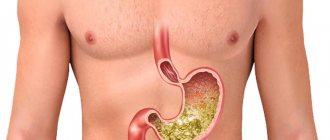According to statistics, everyone has at least once experienced a feeling of heaviness in their stomach. What to do in such cases?
Painful feelings in the abdomen that many patients experience include belching air, heaviness in the stomach, and other uncomfortable sensations. All of them arise for two main reasons: due to an unbalanced diet or due to existing pathologies of the gastrointestinal tract. A gastroenterologist will help you get rid of this problem. You should not neglect a doctor’s examination, since illiterate therapy can only worsen the condition. But first of all, it’s worth understanding how heaviness in the stomach occurs after eating, the causes, and treatment.
How to recognize discomfort?
Bloating and heaviness in the stomach would seem to be understandable and familiar to many, but since they can arise for various reasons, they also have varying degrees of manifestation. For example, a feeling of fullness in the abdomen is common. The reasons are overeating and eating large amounts of food at one time. Among other things, patients experience other symptoms:
starts to feel sick;- the urge to vomit and vomiting appear;
- dyspnea;
- belching;
- heartburn;
- rapid change in body weight;
- increased sweating;
- changes in stool condition;
- pain in different parts of the abdominal cavity.
Depending on the factors that cause abdominal heaviness, symptoms may be short-lived. For example, take place several hours after eating. Some patients experience heaviness in the stomach 2 hours after eating.
If discomfort does not disappear for a long time, you should immediately contact a specialist. This may be a signal that more serious inflammation is developing in the body and organ pathologies are present. In this case, pain and heaviness in the stomach after eating require urgent treatment, because more severe symptoms may occur in parallel. For example, sharp and cutting pain that extends to the cervical region, jaw or even arms.
After eating, heaviness in the right hypochondrium and bloating may also develop. It is quite difficult to unambiguously describe the sensations that patients experience. Some people report a burning sensation and squeezing in the throat, while others compare this discomfort to a sore throat and difficulty swallowing. Along with heaviness in the stomach, belching may also appear. There are many reasons: problems in the functioning of the esophagus, hernia and other pathologies that require special research.
Heaviness in the right hypochondrium and bloating are also common symptoms. Heaviness and painful feelings appear in this area. They differ in intensity and localization. Such sensations usually occur due to diseases of the stomach and intestines, pathologies of the excretory system, appendicitis, gastritis and ulcers. In rare cases, such pain may be the result of gynecological diseases or ectopic pregnancy. But only a specialist can make a correct diagnosis by conducting the necessary laboratory tests.
Why do you feel a heaviness in your stomach?
Before starting therapy, you need to understand how and why heaviness in the abdomen appears. The reasons can be varied, but most often they are:
poor diet: frequent and quick snacks, abuse of junk food, carbonated drinks, predominance of carbohydrate foods, baked goods;- frequent overeating, especially before bedtime;
- eating a large amount of food at one time;
- violation of the diet (eating 1-2 times a day causes heaviness in the stomach after eating and belching);
- preparing dishes from inappropriate products that do not combine with each other and therefore affect the absorption of food;
- the use of exotic ingredients in cooking, which causes such a reaction in the body;
- excessive eating as a result of stress.
In addition, the feeling of a full stomach sometimes occurs due to the patient’s existing pathologies in the abdominal cavity. For example, gastrodiseases, pancreatitis, gallbladder pathologies.
Pregnant women also often develop heaviness in the abdomen after eating. The reasons for this are the load that the fetus puts on the stomach and other organs, high abdominal pressure over a long period of time, or the consequences of toxicosis.
Causes of flatulence
Flatulence can occur for various reasons. In particular, they distinguish:
- nutritional flatulence
- occurs when eating foods that cause increased gas formation (legumes, cabbage, potatoes, brown bread, lamb), as well as highly carbonated drinks; - flatulence caused by digestive disorders
. It could be an enzyme deficiency. As a result of a lack of enzymes, a significant amount of undigested food enters the lower digestive tract. The processes of rotting and fermentation are activated, during which an increased amount of gases is released. Also, an excess amount of gases can be released when the balance of microorganisms in the intestines is disturbed (dysbacteriosis). Such conditions are often the result of serious diseases, so flatulence is a common symptom found in gastritis, duodenitis, pancreatitis, cholecystitis, hepatitis, cholelithiasis, etc. - flatulence caused by mechanical obstacles in the path of food
, for example, in the case of a tumor; - dynamic flatulence
- caused by disturbances in the motor activity of the gastrointestinal tract. Such disorders may be the result of intestinal surgery, acute infections or intoxication; - flatulence caused by circulatory disorders in the intestinal area ( circulatory flatulence
); - psychogenic flatulence
. Stress or nervous tension can lead to impaired intestinal motility, resulting in flatulence.
Heaviness in the stomach in children
After eating, heaviness occurs not only in adults, but also in children. The main reasons for this are quite simple:
- the child consumed a large amount of food at one time;
- the food contained unusual and unusual products;
- poor quality of food or incorrect cooking method.
But in some cases, the factors causing such symptoms can be much more serious. For example, the development of appendicitis or infection with parasites. Preschool children often experience allergies to unfamiliar compounds, but in older adults, the cause of pain and heaviness in the stomach can be stress, fatigue and excessive exercise.
All this causes the development of a large number of diseases of the abdominal organs. But other signs can also occur in the opposite case, that is, as secondary manifestations of other diseases (infectious processes in the kidneys, gastritis, gallbladder pathologies).
Sometimes heaviness and bloating appear in the abdomen, the reasons for this are individual lactose intolerance, which can occur in children. In this case, it is necessary to consult a specialist and exclude the consumption of dairy products in order to make an accurate diagnosis.
Heaviness in the stomach after eating
Belching with air and heaviness in the stomach also occur after eating, but can also be signs of the presence of other pathologies. In parallel with these symptoms, pain appears in the right side and a desire to vomit. As already mentioned, many gastrointestinal diseases have similar symptoms, so only the doctor is able to determine the factor in the appearance of heaviness in the stomach after eating or at another moment. It is important to visit a gastroenterologist in time so as not to worsen the situation.
In the event that a patient abuses unhealthy and fatty foods, heaviness in the stomach after eating is an expected symptom, but a feeling of fullness in the stomach after eating a small amount of food already indicates the presence of dangerous pathologies. In the first situation, the mechanism of action is simple: fatty, spicy or fried foods provoke an abundant release of acid, which is part of the gastric secretion. As a result of its excessive functioning, irritation of the mucous membrane develops and heaviness occurs. Of course, it’s worth visiting a doctor, but to get rid of the symptoms, it’s enough to follow a healthy diet, add more fiber, cereals and broths to your food, but under no circumstances starve yourself due to overeating. Then heaviness in the stomach and belching of air, the causes of which are not related to serious abnormalities, will go away on their own.
Sources
- Baranskaya E.K. Abdominal pain: clinical approach to the patient and treatment algorithm // Farmateka. - No. 14. - 2005. - P. 107-111.
- Gastroenterology. National leadership / ed. Ivashkina V. T., Lapina T. L. - M.: GEOTAR-Media, 2021. - 464 p.
- Ivashkin V. T., Sheptulin A. A. Abdominal pain. - M.: MEDpress-inform, 2012. - 110 p.
- Nogaller A. Abdominal pain (from symptom to nosological form) // Doctor. - No. 4. - 2005. - P. 85-87.
- Osipenko M.F., Kholin S.I., Ryzhichkina A.N. Chronic abdominal pain and irritable bowel syndrome // Attending physician. — No. 2. - 2011. - pp. 28-33.
- Russian Journal of Gastroenterology, Hepatology, Coloproctology // Clinical recommendations of the Russian Gastroenterological Association for the management of patients with abdominal pain. - No. 4. - 2015. - pp. 71-80.
Abdominal discomfort during pregnancy
Heaviness in the lower abdomen in women is a common symptom during pregnancy.
But it is important to distinguish the discomfort that arises due to the development of pathologies from the severity familiar to almost all pregnant girls. Before treatment, it is necessary to understand how heaviness appears in the stomach after eating and the reasons. Such sensations arise due to the fact that the child constantly puts a lot of stress on the stomach. This also happens due to toxicosis, intra-abdominal pressure in the later stages, which also provoke heaviness. Pregnant women are characterized by excessive gas formation, which also causes unpleasant bloating and heaviness in the stomach. Increased gas is a typical problem for expectant mothers; it is affected by excessive amounts of progesterone. Hormones slightly inhibit the peristalsis of the intestines and stomach, which retains food in these sections, so gases are formed more actively. Causes of heaviness in the abdomen:
- eating food quickly;
- inappropriate chewing;
- stressful conditions and severe fatigue;
- eating without feeling hungry;
- overeating before bed.
Certain foods can also cause similar symptoms. For example, some people develop lactose intolerance.
Why is this happening?
The reasons can be very different, as a result of which the stomach muscles lose their strength and ability to contract. This condition may be associated with disruption of the nervous innervation of the stomach during surgery, injuries, diseases of the nervous system, stomach or intestines, various muscular dystrophic conditions, severe infections, and exhaustion of the body due to nutritional dystrophy.
The cause may also be psychosomatic disorders due to neurasthenia or depression. Such attacks also occur in women during pregnancy and after childbirth. Obesity and a sedentary lifestyle increase the risk of this condition. Therefore, atony often occurs in people with compulsive hyperphagia (excessive food consumption), diabetes mellitus, and mentally ill people with polyphagia (an eating disorder with increased appetite or even gluttony). With decompensated diabetes mellitus, there may be a complication in the form of diabetic gastric atony.
How to diagnose heaviness in the stomach?
Since it is usually quite simple to recognize heaviness in the abdomen and bloating, the main emphasis in diagnosing the pathology is on understanding the root cause of the symptoms and forming a further treatment plan. The gastroenterologist is responsible for determining therapy, but if the symptoms are not serious, a therapist can also help.
When faced with heaviness in the stomach, what should you do? Specialists independently determine examination methods:
- biochemical or general AA;
- Ultrasound;
- MRI;
- FGDS;
- X-ray;
- endoscopy of organs.
Any examination should begin with a consultation with a specialist; his task at this stage is to collect a detailed anamnesis, that is, to record a description of the complaints, their properties, and also to conduct an examination of the patient.
Heaviness in the lower abdomen, which does not develop due to gastrointestinal pathologies, appears as a result of an unhealthy eating schedule and poor foods. The patient may eat too much food, and if he eats this way regularly, the feeling of discomfort will not leave the patient. This is a big burden, because the body has to work harder to eliminate the consequences of overeating and other phenomena. Energy consumption increases, the quality of organ functioning decreases, and therefore the likelihood of developing serious diseases increases.
Therapy for a feeling of heaviness in the stomach
A feeling of heaviness in the stomach after eating or at any other time requires immediate treatment.
As a rule, heaviness in the stomach and diarrhea develop as a result of an unhealthy diet or gastrointestinal pathologies. It can be quite difficult for the body to cope with such a load, so it is important to consult a gastroenterologist and other specialists in a timely manner. Under no circumstances should you start self-therapy. All you need to do if you have nausea, heaviness in the stomach, or belching is to reconsider your diet and give preference to high-quality and healthy products.
The decision to take any pills for heaviness in the stomach can only be made by a specialist. To do this, he conducts a detailed examination, identifies the cause of the discomfort, and then prescribes therapy. For patients who feel heaviness in the stomach after eating, treatment must include the following simple rules:
- abstaining from foods high in fat and spicy ingredients;
- limiting the consumption of alcohol and soda;
- refusal of fast food;
- Irregular quick snacks should be replaced by eating food in small portions;
- establishing a diet.
It is important to visit the doctor regularly, since during the treatment process you will definitely need to conduct an intermediate examination and adjust the therapy. After all, medications for bloating and heaviness in the abdomen affect the deep mechanisms of the body; long-term use can disrupt the normal functioning of organs.
Prevention
Paying attention to your health and following the following recommendations will help you avoid the feeling of heaviness in your stomach. So, preventive measures include:
Follow the recommendations and stay healthy.
Related services: Family doctor consultation Videogastroduodenoscopy
How to prevent the development of heaviness in the stomach?
Heaviness after eating brings a lot of discomfort in life, especially when this feeling comes very often. It is much better to take the necessary measures in advance to avoid encountering a problem than to eliminate the consequences.
Since most often patients experience pain and a feeling of a full stomach, the causes of which lie in an unhealthy diet, they need to start with normalizing their diet. If there are signs of heaviness in the stomach after eating, what to do is the main question for patients. The answer is simple: eat more often, but less, avoid overeating and breakdowns, chew food diligently, and take your time. It is important to take care of creating a healthy and balanced diet, in which nutrient-rich, but not very heavy food will prevail. If there is heaviness after eating or belching, you need to give up heavy smoking, drinking alcohol, and reduce the consumption of fatty, spicy foods. It is necessary to stop eating without feeling hungry or fasting for a long time, and you should also avoid stress in the process of eating food, because this also affects absorption and the development of unpleasant sensations.
In addition, it is recommended to build your nutrition schedule in such a way that once a week you can reduce the absorption of particularly carbohydrate foods and increase the amount, for example, of fiber and useful minerals. Adhering to these rules is recommended not only for patients who have experienced heaviness in the stomach and nausea after eating, but also for those who want to normalize the functioning of the body as a whole and the abdominal organs.
In order to avoid the unpleasant consequences of heaviness in the stomach and nausea, you need to pay attention to your diet and lifestyle:
- reducing portion sizes and eating more frequently;
- choosing a lighter and healthier diet, since the most common situation is heaviness after fatty foods;
- following a regimen: have breakfast, lunch and dinner at the same time to allow the stomach to develop an activity mode;
- do not overeat before bed: experts advise not to eat 2 hours before bedtime;
- reducing stressful situations in life;
- high-quality chewing of food and no snacking on the go;
- eating fresh foods that are not too hot or too cold;
- getting rid of bad habits;
- reducing the volume of consumed semi-finished products, concentrates, etc.;
- increased physical activity;
- frequent walks in the fresh air.
In the event that there is heaviness in the stomach, the causes of which are related specifically to the culture of nutrition, following all these rules will help get rid of the symptoms, as well as eliminate problems with the gastrointestinal tract. It happens that the causes of discomfort lie in other serious pathologies. Such a regimen will have a beneficial effect on the condition of the body, will help to quickly cure diseases, nausea and heaviness after eating, especially when combined with drug therapy.
Therapy problems
Consultation and dynamic observation of various specialists is necessary - a gastroenterologist, nutritionist, psychotherapist.
Treatment should be comprehensive, including medications, as well as proper nutrition, herbal medicine (infusions of dandelion, ginseng, chamomile, rosehip) and diet therapy, lifestyle changes, physical therapy and correction of concomitant diseases. The basic principle in nutrition is eating fractionally and in small portions. In this pathological condition, a daily diet is selected with a nutritionist and gastroenterologist.
It is recommended to completely exclude alcohol, chocolate, coffee, fresh vegetables, fried, smoked, salted and marinades. As well as fatty foods, especially cakes and pastries.
Therapeutic measures are aimed at eliminating nausea and vomiting, enhancing gastric motility and peristalsis, restoring proteins, trace elements and vitamins in the body.
It is important to include regular exercises in your lifestyle to strengthen the abdominal and abdominal muscles. It’s worth learning to do the “vacuum” exercise in the morning: strongly draw in your stomach and hold your breath for 15 seconds, 10-12 times.
Medicinal plants: 45 recipes for a healthy stomach and liver Read more








